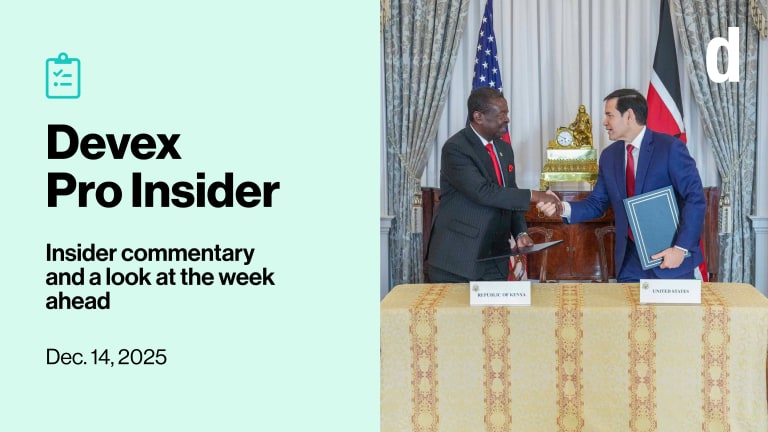Devex Pro Insider: The great private sector pivot?
In the wake of USAID’s dismantling, can the agency’s former implementing partners find a new market for their global development expertise? Many are eyeing a pivot to private sector-led development, but it may be easier said than done.
This is a special Saturday edition of Devex Pro Insider from Senior Reporter Michael Igoe. This limited-edition newsletter tackles some of the biggest questions about the future of U.S. foreign aid, with insider reporting and analysis delivered straight to your inbox. The U.S. Agency for International Development was not just the world’s largest bilateral foreign aid donor. It was also the engine of an entire development ecosystem, providing the foundational support that sustained a global network of partner NGOs and for-profit contractors. In the wake of USAID’s dramatic dismantling, that ecosystem’s resilience — and the adaptive capacity of those within it — is being tested like never before. “This is a mass extinction event from which, just as in previous mass extinction events, something new has emerged. But that’s cold consolation if you’re on the working end of that mass extinction event,” Steve Schmida, the co-founder and CEO of Resonance, tells me. There is still much more unknown than known about what will emerge from the rubble of the USAID-led global development system. Several people I spoke to for this newsletter said that while official development assistance, or ODA, is currently in sharp decline, they expect it will return at some point. But if ODA does return, what will it return to? How will the current crisis reshape global development, and which organizations will survive — or even thrive — through that transition? I’ve heard versions of those questions asked over and over again in recent months, and the answers — however tentative — seem to gravitate toward a common theme: private sector partnerships and private capital mobilization. That has still felt hazy and abstract to me, though. What does it mean for a legacy USAID — or U.K. aid — implementing partner to pivot toward working with the private sector? Pivot how? For what purpose? Who will be able to pivot and who won’t? What are we even talking about when we say “the private sector”? So I set out in search of some clarity. ‘Everything is on the table’ Our journey starts not in Washington, D.C., but in London, where the charity Street Child — which assists children in emergencies — was incorporated just under two decades ago. In the last year, the organization has seen two of its major donors pull back. “From the first of January, we will not be receiving any funds from the British government for the first time since January 2013,” Tom Dannatt, the organization’s founder and CEO, tells me. That stark reality is compounded by major funding shortfalls at one of Street Child’s other big donors, UNICEF, which has been hit hard by the Trump administration’s pullback of U.S. government funding to United Nations agencies. “The squeeze is on,” Dannatt says. For Street Child, that has meant moving discussions that were happening in the background to the center of a strategic “retooling,” and that has happened in two main areas. The first relates to philanthropic funding. Dannatt says that large institutional donors such as the U.K. government or UNICEF have often thought about funding organizations in terms of how they fit within that donor’s own goals — “Where have you got presence? What’s your coverage? What can you absorb?” Philanthropic funders are more likely to care about an organization’s identity, Dannatt says, and as a result, Street Child has been working hard to “sharpen” its image. He wants philanthropies to know that Street Child is “the children in emergencies charity.” But the organization’s pivot goes beyond better branding for philanthropic funders. The aid crisis has pushed Street Child to embrace its own creativity and agility, Dannatt says. The flip side of financial scarcity has been the breakdown of long-standing institutional roadblocks that often relegated new ideas to the sidelines of strategic planning. "Everything is on the table," Dannatt says. One example of that is a partnership between Street Child and a charity called Humanity Insured — to provide parametric insurance to disaster-prone communities. Dannatt says the conversation between Street Child and Humanity Insured had been happening in the background for a couple of years. When the aid cuts came, he says, “I leant on our corporate team and said, ‘Hey, this is the sort of thing I think we need to be putting more effort in now.’” The partners pushed to get their first round of insurance coverage in place by Nov. 1, which marks the start of hurricane season in the Indian Ocean. Dannatt says the current pilot project covers 100% of the premium for recipients. Dannatt is also not glossing over what has been lost. Street Child spent two years piloting a proven learning intervention to 147,000 students in Somalia, which it was preparing to expand. “The entire program was cut overnight,” Dannatt says. “You can’t innovate your way out of that. That is a vast number of children not about to get a proven intervention that could, frankly, have changed their lives.” ICYMI: After the cuts, can the aid system deal with the next disaster? The language of business value The Vermont-based development consulting firm Resonance was better positioned than many for the funding shifts that rippled outward from USAID’s dismantling, says Schmida, the CEO. Resonance already had some corporate and foundation clients, he says — and it took about five years to build up that “dual capability.” “If an organization has been working exclusively with USAID or the U.S. government for decades, I think it is very, very hard to have the capabilities to make a pivot in real time to a private sector client base,” Schmida says. “The dynamics are fundamentally different,” he says. “USAID was incredibly process-driven. Everything was about process. Whereas most companies don't really care about what the process is. They just want a result.” Schmida says that development organizations that want to make this pivot have to get better at speaking the language of “business value.” One area where he sees corporate and development interests converging is around what he calls “the people and environmental aspects of supply chain resilience.” For example, before its dismantling, USAID was focused on the lack of opportunity in agriculture for young people in Africa and Latin America. “That’s still a problem,” Schmida says, including for big food companies. But for those companies, “it’s not a development problem. It’s a resilience problem,” he says. “If the workforce of their major supplier is aging out, that makes their supply chain much more brittle.” Schmida says there is a role for development organizations to help foster “unusual” collaboration. For Resonance, that has meant working with corporate and foundation clients “to build stronger relationships that are impact-driven and deliver business value,” he says. What risks getting lost in that shuffle are what Schmida calls “pure play public goods” — investments in things such as basic education or democracy and governance — where “there's not an obvious way for the private sector to engage in a way that creates business value.” “I think those are the areas that will struggle the most to bring in new clients or attract funding,” he says. Related reading: How can we reinvent aid? See also: After the aid cuts — what’s next for INGOs? Know thyself It’s important to be clear: This isn’t all new. USAID had extensive — and growing — programs aimed at private sector engagement and private capital mobilization, which explicitly sought to use — and measure — bilateral assistance dollars as leverage for corporate and philanthropic investment. The point is that for many USAID implementing partners, that was not their core business. For many, that core business was project management on behalf of a few — or sometimes really just one — government donors. The question for those organizations is whether pieces of that infrastructure and experience can be salvaged and retrofitted for a different client base with different interests and expectations. “Can this industry pivot and move away from just traditional project management for government clients?” asks Aubrey Hruby, the co-founder of Tofino Capital and a transaction adviser for Palladium, formerly a major USAID implementer. “I don’t know the answer to that.” “It’s very hard to change the fundamental service that you’re selling,” she says. Some organizations — whether by luck or foresight — are better positioned to reach new clients than others. For example, Palladium, which was founded in 1965, was bought in 2022 by Global Infrastructure Solutions Inc., which owns multiple other companies involved in infrastructure and construction management. For its part, Palladium has its own mining and infrastructure practice, though this was historically smaller than its work with USAID. Hruby says the arrangement creates an opportunity to package Palladium’s development offerings together with the capabilities of its sister companies within GISI, to expand the range of services they are able to offer collectively to potential clients beyond the U.S. government. For example, that could mean a “sister company” that offers mining feasibility studies is now able to bring on board Palladium’s capabilities around community engagement and “earn that combined entity different clients,” Hruby says. Even before Elon Musk set his sights on USAID, there were signals that some of the standard development business models — such as cost-plus contracting, which pays a fixed fee on top of all expenses — were under pressure. Hruby says Palladium has leaned into alternatives such as “pay for results,” which ties payment to the achievement of specific, verifiable outcomes. All of this requires a clear-eyed assessment of what business your organization is in, whether you have the right people to deliver it, who’s going to buy it, and at what price. “I've always struggled with the term ‘private sector.’ No one goes to a cocktail party and says, ‘I work for the private sector.’ That is only a term that exists in juxtaposition to the government,” she says. “What service are you actually selling, and to whom?” ICYMI: How is the private sector thinking about development? See also: How private investors want to engage with development finance Don’t miss: Private sector must fill gaps — but obstacles remain, ICC warns + For more insider reporting on how business, philanthropy, and development finance leaders are tackling global challenges, sign up for Devex Invested, our free, Tuesday newsletter. Filling the gap For some, the future of development doesn’t belong to legacy organizations retooling for new clients, but to a new wave of entrants built differently to fill gaps in the global development landscape. “It is about finding the $15 trillion shortfall to achieve the Sustainable Development Goals,” says Mark Walter, a lawyer and longtime development practitioner whose new company, BluStraits, promises “legal and regulatory innovation” aimed at unlocking economic growth. “I think it’s going to be the new companies that come along and fill the gap,” Walter says. In his view, international development strayed from the path of “real demand driven economic growth programming” into donor-driven “theories of change programming.” “It had become too insulated, too much of a Washington, D.C.-based thing, and not enough of a field-oriented industry or effort,” Walter says. He believes that overseas development assistance will return, but when it does, he hopes it will be guided by “real localization.” “That means asking local organizations and people just exactly what it is that they think can be accomplished, and what are the real interests in accomplishing something in a particular environment,” Walter says. He sees big opportunities in driving investment into countries for midsized infrastructure and energy investment — things such as health clinics, small schools, small infrastructure, feeder roads, cold storage, and micro hydroelectric power systems. It’s also possible that development assistance will return, and that the old system will reappear, Walter says. “There may not be a reckoning in the end … and that would be disappointing,” he says. “There's a lot of opportunity out there to make changes that are much more in concert with those who have both economic interests and the finances to do this.” + Check out our page dedicated to our reporting on localization. + The Trump effect: Explore our dedicated page to catch up on all the latest news, in-depth analysis, and exclusive insights on how the Trump administration’s policies are reshaping U.S. aid and global development. Update, Nov. 4, 2025: This article has been updated with additional information about the partnership between Street Child and Humanity Insured.
This is a special Saturday edition of Devex Pro Insider from Senior Reporter Michael Igoe. This limited-edition newsletter tackles some of the biggest questions about the future of U.S. foreign aid, with insider reporting and analysis delivered straight to your inbox.
The U.S. Agency for International Development was not just the world’s largest bilateral foreign aid donor. It was also the engine of an entire development ecosystem, providing the foundational support that sustained a global network of partner NGOs and for-profit contractors.
In the wake of USAID’s dramatic dismantling, that ecosystem’s resilience — and the adaptive capacity of those within it — is being tested like never before.
This story is forDevex Promembers
Unlock this story now with a 15-day free trial of Devex Pro.
With a Devex Pro subscription you'll get access to deeper analysis and exclusive insights from our reporters and analysts.
Start my free trialRequest a group subscription Printing articles to share with others is a breach of our terms and conditions and copyright policy. Please use the sharing options on the left side of the article. Devex Pro members may share up to 10 articles per month using the Pro share tool ( ).
Michael Igoe is a Senior Reporter with Devex, based in Washington, D.C. He covers U.S. foreign aid, global health, climate change, and development finance. Prior to joining Devex, Michael researched water management and climate change adaptation in post-Soviet Central Asia, where he also wrote for EurasiaNet. Michael earned his bachelor's degree from Bowdoin College, where he majored in Russian, and his master’s degree from the University of Montana, where he studied international conservation and development.








